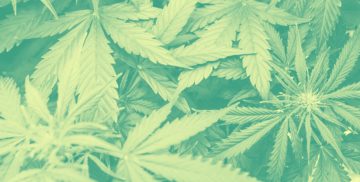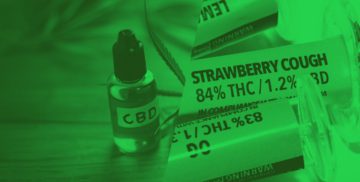What Is CBD & Who Can It Help
CBD (aka cannabidiol) has evolved from an obscure health food store supplement to the darling of the UK wellness industry, popping up in every product from face cream and hummus to your morning latte. But just what is CBD? Who can benefit from it, and are there any risks?
Use the links below to jump to a specific topic.
What Is CBD?
CBD is one of 120 known botanical compounds called ‘cannabinoids’ that are found in hemp and cannabis. Along with its more infamous relative THC (tetrahydrocannabinol), CBD interacts with the body through a structure known as the endocannabinoid system.
The endocannabinoid system is a network of receptors found primarily in the brain and the immune system, however newer research has shown that ECS receptors may also be found in the skin and reproductive system.
You might be surprised to know that humans are born with a built-in system that specifically interacts with cannabinoids, but the ECS does a lot more than just play around with CBD and THC molecules. The ECS is thought to play an important role in the reproductive system, as well as the regulation of mood, appetite and memory (so it’s no wonder that cannabinoids like THC and CBD have a particular effect on all those things).
Do You Get High on CBD?
While CBD is often publicised as a “Non-psychoactive” substance, this isn’t technically true. While CBD won’t make you feel “high”, it does stimulate endocannabinoid receptors in the brain to produce a variety of effects.
Unlike THC, you’re not going to feel any psychoactive “high” after taking CBD. Instead, you’ll notice a calming, grounding effect. As such, you should think about CBD as a psychoactive in the same way that caffeine is a psychoactive.
So What Are the Health Benefits?
Although definitive research around the health benefits of CBD for some conditions is still lacking, current scientific studies have shown that CBD can be highly beneficial for a variety of conditions, including:
- Calming anxiety
- Soothing inflammation
- Moisturising skin
- Reducing acne
- Improving cardiovascular health
- Helping sexual dysfunction
Calming Anxiety
CBD can help to reduce anxiety by interacting with CB2 receptors in the brain to alter your mood. A 2015 study found that CBD had “considerable potential” as a treatment for several common anxiety conditions including generalized anxiety disorder, social anxiety disorder and PTSD.
Soothing Inflammation
Through interacting with CB2 receptors in the immune system, CBD can alter the body’s inflammatory response to soothe inflammation in the body and speed up healing. While this inflammatory response is necessary to fight off infection and heal trauma, when the body’s inflammatory response is overstimulated this can result in chronic inflammation. This overstimulation can be caused by factors like stress, environmental pollutants and autoimmune conditions. When left untreated, chronic inflammation is linked to more serious health complications like heart disease.
Moisturising Skin
CBD oil is full of skin-loving ingredients like fatty acids, and vitamins C, E and D. Fatty acids are essential for keeping the skin’s moisture barrier happy and healthy, which in turn protects the skin from environmental damage and harmful bacteria. As you may have guessed from the name, your moisture barrier is also integral for preventing moisture loss in the skin.
Reducing Acne
While CBD oil works as an effective treatment for dry skin conditions, it’s anti-inflammatory properties can also be particularly helpful in fighting inflammatory skin issues like acne. Through interacting with endocannabinoid receptors in the skin, CBD can effectively soothe acne break-outs, while reducing the likelihood of future flare-ups by keeping the skin balanced and healthy.
Improving Cardiovascular Function
A 2017 study published in the Journal of Clinical Investigation found that a single dose of CBD was enough to reduce blood pressure. As poor blood pressure and hypertension are linked to a wide range of other negative health conditions, CBD’s ability to improve circulation could be a solution for many health concerns.
Helping Sexual Dysfunction
Because of its ability to aid in cardiovascular function, CBD also has potential as a holistic treatment for sexual dysfunction. One of the primary causes of sexual dysfunction arises from poor circulation, as a result of hypertension caused by aging. When applied topically, CBD acts as a vasodilator, which means it expands blood vessels and increases blood flow to a targeted area. Because of its ability to work as a vasodilator, CBD has become a highly sought after ingredient for sexual lubricant – with companies like Privy Peach and Foria Wellness jumping on this intriguing new trend.
Ways of Taking CBD
While edibles and CBD beverages have been gaining more popularity recently, the most popular (and most effective) methods for taking CBD include vaping, CBD capsules, CBD oil tinctures, and topical CBD like creams and balms.
Vaping
Vaping CBD oil is one of the most efficient ways of getting the active cannabidiol into your system as quickly as possible to see instant results. This is because when you inhale CBD, it is absorbed into the bloodstream through tiny capillaries in the lungs. Just make sure you’re purchasing high-quality products from a reputable brand, that have received third-party lab testing to confirm the safety of their ingredients.
Capsules
CBD capsules are a hugely popular choice among UK consumers because they’re just so easy to use. They offer consistent portions of CBD that are carefully dosed, so you’ll always know you’re going to have the same dosage of CBD. On top of that, they save you from the fact that CBD oil doesn’t taste that great.
Tinctures
CBD oil tinctures are one of the most popular methods of consuming cannabidiol among UK consumers because they make it incredibly easy to regulate your dosage. Simply fill up your dropper, deposit a few drops of CBD under your tongue and wait for the calm to kick in.
You’ll notice that manufacturers often print instructions for you to hold the oil under your tongue for 30 seconds before swallowing. By doing this, you’re giving the sublingual gland under your tongue more time to absorb as much of the active CBD as possible, to give you the most bang for your buck.
A word of warning: Stronger CBD oil tinctures can taste quite bitter, so we recommend having a coffee or sweet beverage on hand to counteract the taste.
Cream
Topical CBD creams have become an increasingly popular product in the natural skincare industry, for their soothing and anti-inflammatory properties. CBD is also easily suitable for a variety of skin types, while also being a very stable ingredient that is unlikely to react badly with other active skincare ingredients like chemical exfoliants and vitamin C.
Balm
CBD balm is particularly effective at targeting localized pain and inflammation for quick relief. It can also help you out if you are feeling stressed out and need to relax. This makes it a great choice for athletes, or anyone that lives a particularly active lifestyle.
What Are the Side Effects of Cannabidiol?
While shady regulation around CBD has left a lot of consumers unsure about how safe it is, don’t worry – according to a World Health Organization report, “CBD exhibits no effects indicative of any abuse or dependence potential” in humans.
That being said, CBD products can still come with a few side effects – however these are mostly just mildly annoying rather than serious health risks.
Some commonly reported side effects of CBD include drowsiness, nausea, changes in appetite, dry mouth and dizziness.
What Are the Different Types of CBD Oil?
So you’ve made up your mind, and you’re going to give CBD oil a shot – only to discover that you now have to learn about what type of CBD oil you’re going to use, which can be daunting to say the least. In reality, the difference between the most common formulations of CBD oil – full-spectrum CBD, broad-spectrum CBD, and CBD isolate – is actually pretty straight forward.
What’s the Difference Between Broad Spectrum, Full Spectrum and Isolate CBD?
Full-spectrum CBD oil contains all the naturally occurring cannabinoids and botanical compounds found in the hemp plant, along with CBD. As such, full-spectrum CBD oil also contains a small amount of THC. While it’s nowhere near enough to actually get you high, this small THC percentage may contribute to a phenomenon known as the “entourage effect”, which proposes that CBD works better alongside all the other cannabinoids and compounds found in hemp.
Broad-spectrum CBD oil contains most other cannabinoids compounds, just with all traces of THC removed. This makes broad-spectrum CBD a popular choice for the European market, where THC is more highly criminalized than in places like Canada and certain U.S. states. It also means that you can benefit from the entourage effect without worrying about THC.
In contrast, CBD isolate is a powder extract that solely contains pure CBD, with all other cannabinoids and botanical compounds removed. It can then be added to carrier oils to make CBD isolate oil. While you won’t get the benefits of all the other cannabinoids, CBD isolate can contain much more potent levels of CBD – so if you want a stronger CBD oil, isolate may be the best choice.
What Is an Extraction Method & Why Is It Important?
An extraction method is the term used to describe how CBD is extraction from all the other cannabinoids and botanical compounds, to create CBD isolate. One of the most common methods is CO2 extraction, which involves using liquid CO2 to separate CBD from all the other plant compounds. This method of CO2 extraction is also used to decaffeinate coffee beans, and to create essential oils.
CBD isolate can also be extracted using ethanol. Alternatively cold-pressing industrial hemp is one of the most common methods for creating organic, broad-spectrum and full-spectrum CBD oil.
The method used to extract the CBD compound can play a huge role in how that product can be marketed and sold.
For example, in the Republic of Ireland CBD isolate products processed by CO2 extraction cannot be sold without EU novel food authorisation, because of the possibility of contaminants introduced through the extraction process. In contrast, organic cold-pressed oils can be legally sold without novel food authorisation.
Which Form of CBD Oil Is Best?
The boom in popularity of CBD products has been something of a blessing and a curse. With so many types of CBD oil on the market, you get more variety for consumers – but also the headache of deciding which one will work best for your needs. Finding which form of CBD oil is best for you may depend on a variety of factors.
- What you’re using it for
- Your budget
- The legality of THC in your area
If you live somewhere where THC is legal and regulated, then full-spectrum CBD is a great option. If keeping things as natural as possible is also a big deal breaker for you, then full-spectrum CBD is probably the best choice as it undergoes the least amount of processing. If you prefer organic products but live somewhere where THC is not legal, then broad-spectrum CBD would be the best choice.
If you’re curious and want to experiment with CBD for its calming, grounding properties, then try a low-strength CBD oil made with broad or full-spectrum CBD. The lower percentage means you can test the waters and see how if affects you without too much risk, and these products are cheaper than high strength and isolate products.
CBD isolate may be a better option for anyone who wants a more potent dose of CBD, just be mindful about how the extraction process of some CBD isolate products may clash with regulation in your area. CBD isolate can also be considerably more expensive than broad-spectrum and full-spectrum products, since you’re paying for more of the active CBD.
How Much CBD Should I Take?
Knowing how to dose your CBD is a tricky question because there is no right answer. Much like your fingerprints, everyone’s endocannabinoid system is similar but totally unique – so how you react to a certain CBD product may differ from how your friend might react.
Translating the strength listed on the bottle into how much you’ll actually be consuming, is just a matter of dividing the strength by how much oil is in the bottle. So a 10 ml bottle of 500 mg of CBD, will give you 50 mg per 1 ml, which is one dropper full. Most CBD products will come with a recommended dosage, depending on your needs.
One handy way to figure out a CBD dosage is by using your body weight and a dosage calculator for reference, like the one below.
Where to Get CBD
These days, it seems like CBD is available literally everywhere, so finding CBD products isn’t particularly difficult. However, finding the most reputable and trustworthy CBD brands can involve a bit more research. Look for transparent brands that offer 3rd party tested lab reports on their website to verify the CBD and THC percentages in their products. Some of our favourites are CBD Village, and FourFive CBD.
As CBD has become increasingly mainstream, it’s now readily available in many high street pharmacies and health food stores like Holland and Barrett.




















